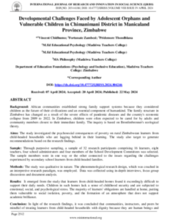Background:
African communities established strong family support systems because they considered children as the future of their civilizations and an essential component of humankind. The family structure in Zimbabwe has changed as a result of the severe effects of pandemic diseases and the country's economic collapse from 2009 to 2022. In Zimbabwe, children were often expected to be cared for by adults and community members closest to their immediate family. The inquiry is based on Bronfenbrenner's ecological theory.
Aims:
The study investigated the psychosocial consequences of poverty on rural Zimbabwean learners from child-headed households who are lagging behind in their learning. The study also aimed to generate recommendations based on the research findings.
Sample:
Through purposive sampling, a sample of 32 research participants comprising 16 learners, eight teachers, four school administrators and four members of the School Development Committees was selected. The sample members were in one way or the other connected to the issues regarding the challenges experienced by secondary school learners from child-headed families.
Methods:
The study was qualitative in nature. The phenomenological research design, which was couched in an interpretive research paradigm, was employed. Data was collected using in-depth interviews, focus group discussions and document analysis.
Results:
It emerged from the study that learners from child-headed homes found it exceedingly difficult to support their daily needs. Children in such homes lack a sense of childhood security and are subjected to emotional, social, and psychological stress. The majority of learners' obligations are handled at home, putting them vulnerable to social isolation, poverty, and the formation of an atmosphere that does not support academic brilliance.
Conclusion:
In light of the research findings, it was concluded that communities, instructors, and peers be mindful of treating learners from child-headed households with dignity because they are human beings and resources for the nation. They should avoid cultural perspectives that increase marginalization and segregation of these learners.

